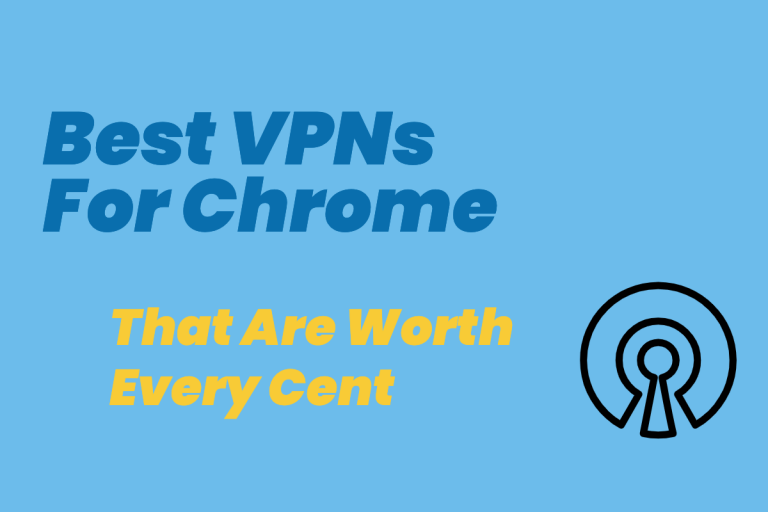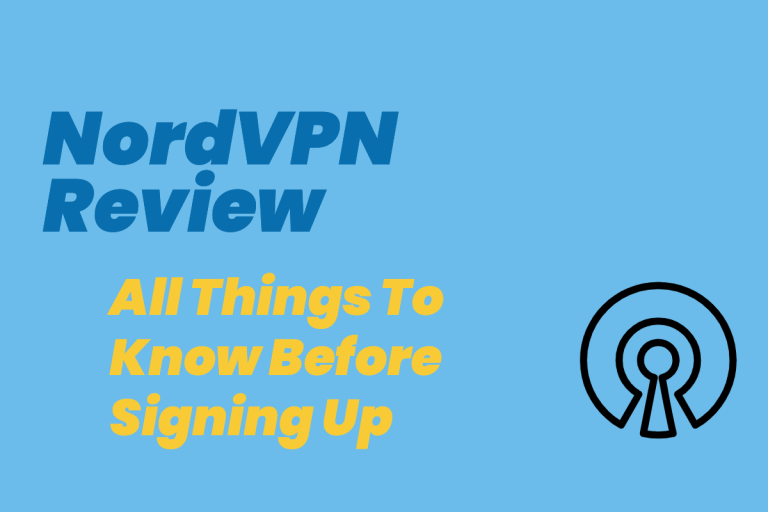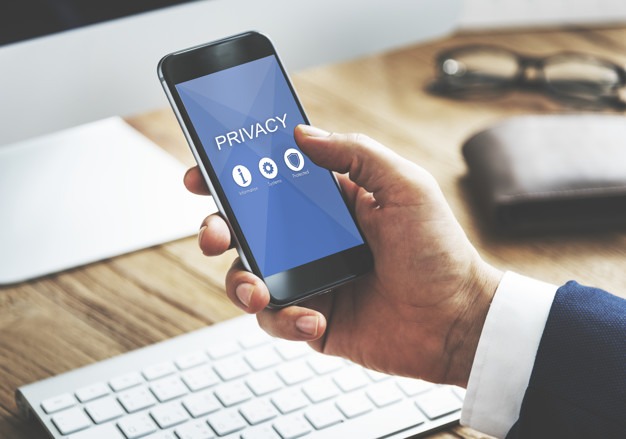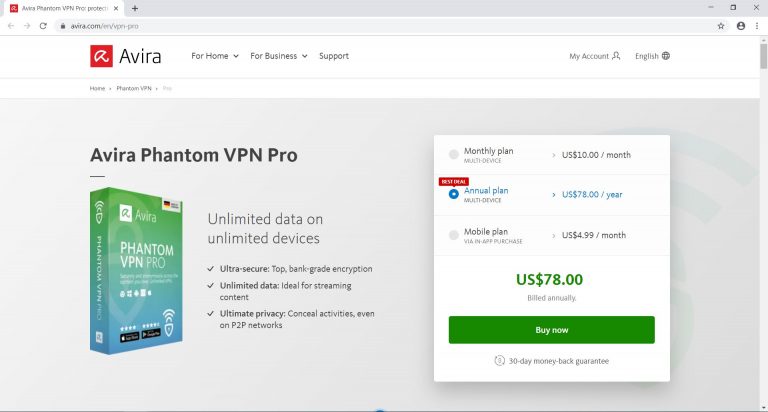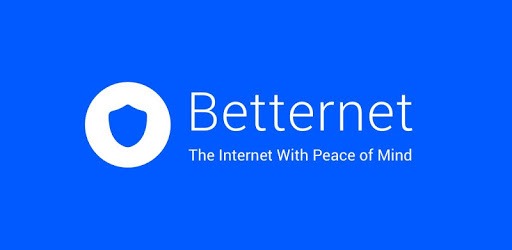Private Internet Access (PIA) VPN Review
VPNs are vital tools to keep you safe online, and in this Private Internet Access VPN review, we closely analyze one of the top VPNs on the market today. Learn what our overall score for the company is, how it compares to other top VPNs, and how to know if it’s the right choice for your needs.
Plus, get our tips for saving money on your subscription–and for deciding whether or not it’s worth paying for a VPN in the first place.
Why Do I Need a VPN?
VPN stands for virtual private network. You might not realize it, but your internet connection is, in truth, quite insecure. Whether you’re on a coffee shop wifi on your phone or laptop that leaves you open to hacking or whether it’s your internet service provider (ISP) who is spying on your internet browsing history, you are open to a loss of privacy at the least and serious security concerns at the worst.
VPNs were originally designed by corporations to create a private network or tunnel that couldn’t be hacked on spied on. This enabled employees to work from home securely by logging into the VPN. Today, VPN use is much more widespread. Because VPNs route your activity through their servers, your ISP can’t see your true geographical location–it only sees the VPN server’s location.
Reasons to Use a VPN
Thanks to VPNs’ unique features, here are some of the most popular reasons they’re used today:
Prevent censorship
Countries like China heavily censor internet activities, blocking websites like Facebook and Google. VPNs are popular in countries like this because they allow people to get around the restrictions to access the pages of their choosing.
Prevent government overreach
Even if you don’t live in a country like China that outright restricts access to certain websites, you might simply prefer that your browsing history isn’t being spied on.
Secure wifi
Public wifi (and even private home wifi networks) are notoriously insecure; VPNs allow you secure access to your private information.
Avoid geographical restrictions
One of the most popular examples of these reasons for using a VPN is Netflix. Largely because of geo-specific licensing agreements, Netflix offers different shows and movies depending on where you live. If you live in Canada, for example, you might get shows that you can’t get in the United States or Australia. VPNs allow Netflix subscribers to use servers in different countries to get around this restriction (more on that shortly).
Torrent or use P2P applications anonymously
Using peer to peer applications (P2P) like torrenting makes your IP address available online; using a VPN allows you to torrent anonymously, without exposing your true location.
What Should I Prioritize in a VPN?
There are a ton of great VPNs–and a lot of not so great ones. How do you know what to look for? Well, that’s part of why we’re writing this Private Internet Access VPN review–to help you sift through whether or not a VPN has what it takes. Outside of that, however, you’ll still need to decide which good VPN is right for you.
Here are a few questions to help you decide:
How much is it?
You can easily pay more than $10 a month for a VPN or you can use a free VPN. There are some decent free VPNs but most of them set limits on the amount of data you can use. Since almost everybody these days uses the internet to stream, you’ll hit your data limit quickly. Our recommendation is to go with a paid VPN — you can easily find one for just a few bucks a month if you’re on a tight budget.
How many devices do you need to cover?
If you have something in your home connected to your wifi (this includes Alexa, Nest, and more), you’ll want to make sure it’s on a VPN. Most VPNs limit the number of devices you can run at one time, however, and the more people and gadgets you have in your home, the more limiting this can be. There’s an easy fix: some VPNs also sell routers that come pre-connected to your VPN so that everything on your wifi counts as one device. These cost more, but they might be worth — and their presence might help you decide whether or not the company is right for you.
How many servers do your potential VPN have and where are the located?
The number of servers a VPN has is a good indicator of whether or not it will be around for another ten years as well as how good the service is. Basically, the bigger the number, the better. Where the servers are located is important if you’re trying to avoid government censorship, get access to certain websites, and so forth. It also might indicate potential problems — servers in Russia, for example, might mean that the VPN has compiled with certain Russian restrictions, which put your server’s privacy in jeopardy.
Where is the company registered?
Any company has to comply with the laws of the country it’s headquartered in. Private Internet Access (PIA), for example, is registered in Romania. The host country’s legal culture around privacy and security is important in terms of protecting your data.
Will you be torrenting?
If you’re planning on using your VPN for torrenting or other P2P uses, you need to make sure it’s not against company policy. Some VPNs block torrenting; some also restrict torrenting to specific servers.
How tech savvy are you?
If you’re not comfortable with installing new apps or are worried about problems, look for a VPN that ranks highly for customer satisfaction. Also, pay attention to ease of use — is it easy to use or difficult? How difficult is it to contact customer service and get help when you need it? What is the refund policy like if you have a problem? Is there a free trial?
Does your VPN keep customer logs?
Here’s an example: PIA is registered in the United States, which has been known to compel companies to turn over customer data. PIA, however, doesn’t log customer data, so it has nothing to turn over. This is ideal for almost every situation, but another good way to look at how secure and trustworthy your VPN is is to look at its transparency — is it open to third-party security audits? Does it have a clear, well-defined privacy policy?
These questions can help provide a framework for understanding which VPN will best meet your needs. There’s no such thing as a perfect VPN, and things change rapidly in the tech world, but understanding what you need and how to find it is half the battle.
How Does Private Internet Access (PIA) VPN Work?
Private Internet Access VPN (PIA) is a VPN out of the United States. It’s registered in the states and is one of our favorite options for a high-quality, affordable VPN for most people. Here’s what you need to know about:
1. It’s Priced Affordably
Here’s PIA’s current pricing structure:
- $6.95/mo for monthly subscription
- $3.33/mo for annual subscription (you’ll pay for a year at a time)
- $2.91/mo for a two-year subscription (you’ll pay for two years at a time)
2. PIA Has Over 3,300 Servers in 33 Different Countries
PIA has servers in every continent except Antarctica, and there aren’t many VPNs with a larger number of servers! The only country PIA has expressly exited is Russia, citing security concerns thanks to increasing scrutiny and overreach.
While there are VPNs with a larger number of servers and with a more diverse placement, PIA has enough servers in enough different countries to satisfy most client’s needs.
3. PIA Prioritizes Privacy and Security
PIA keeps zero customer logs and goes so far as to create a regular transparency report. The most recent report indicated that PIA provided zero customer data in two subpoenas and one warrant. PIA also uses encrypted wifi to keep the entire user process as secure and as safe as possible.
4. You Can Use Up to 10 Devices at One Time
There aren’t many VPNs that allow as many devices as PIA does–ten is an extremely generous number! If you fear that won’t be enough, however, PIA offers routers that have their software preinstalled VPN software on so you can treat all the devices on your router as one.
5. Easy to Use, Instant Setup
PIA makes the entire setup process a breeze. Its dashboard is easy to use, which is also a nod to how PIA listens to its customers. Several years ago, PIA was criticized for not being intuitive and easy to use. Today, however, it requires just a few seconds to download the VPN and get started with.
The intuitive start process takes you directly from step to step so that there’s no doubt about what to do next. It’s also worth noting that PIA can be canceled at any time by hitting the large cancellation button. Some other VPNs make canceling more complicated.
6. You Can Use Alternate Forms of Payment
In addition to taking Bitcoin and other cryptocurrencies, PIA also accepts gift card payments from major gift retailers (including places like Starbucks). If anonymity and privacy are high on your priorities list, you can easily purchase gift cards for cash and use them to pay for your VPN–you’d be nearly untraceable.
Whoa! PIA accepts gift card payments from major gift retailers as well as Bitcoin and other cryptocurrencies!
In addition to cryptocurrency and gift cards, you can use most major credit cards to pay, as well.
These are just a few of PIA’s most popular features; below, we’re weighing the pros and cons of each and comparing PIA to other competitors, like NordVPN and CyberGhost. Let’s see how PIA stacks up!
Private Internet Access VPN Pros
Here are our top reasons for going with PIA for your VPN:
1. Private Internet Access is Fast and Reliable
Thanks to PIA’s large number of servers across the globe, its service is impressively fast. Speed is always a concern with VPNs, but we’ve heard of few problems from customers using this network. Plus, there’s the excellent fact that you have the option to avoid geo restrictions on every major continent.
2. PIA VPN Doesn’t Log User Activity
As we’ve seen through its transparency report, even when PIA receives a warrant or subpoena, there’s nothing to hand over because the company doesn’t track user activity. There are no user logs so your browsing history can’t be exploited, and the company’s only source of revenue is your subscription–there’s no data selling going on.
3. Use Bitcoin or Other Cryptocurrency
Cryptocurrencies aren’t the fringe pursuit they used to be, and we appreciate that PIA accepts Bitcoin (and others). This combined with your ability to subscribe using gift cards gives you a lot of purchasing options you don’t have at other VPNs.
4. Solid Customer Support
If you have a problem and need help, PIA offers a robust customer service system with full trouble ticket customer support. You can browse the VPN’s extensive knowledge base and guides to find answers or submit a claims ticket to receive personalized help.
Plus, VPN has recently announced that it will be making its support source code open to the public, further indicating its commitment to high levels of openness and transparency.
5. You Can Run P2P Applications
For those who want to run P2P or BitTorrent, you’re in luck! You can do so with PIA–and you don’t have to stick to specific servers. This is a tremendous advantage compared to other VPNs, especially combined with PIA’s relative speed and affordability.
6. High Number of Devices Per License
Unlike some VPNs which limit users to seven or even five devices, PIA allows users up to ten devices per license. Since most of us are only adding devices–and not minimizing them–this is a big pro for PIA. You tend to get what you pay for when it comes to VPNs, speed, and device limits, but PIA is a nice surprise here.
PROS
- Private Internet Access is fast and reliable
- PIA VPN doesn’t log user activity
- Use bitcoin or other cryptocurrency
- Solid customer support
- You can run P2P applications
- High number of devices per license
Private Internet Access VPN Cons
Like most VPNs, PIA also comes with some cons. Here are our top concerns with this VPN:
1. There’s No Live Support
If you need lots of help with anything tech and don’t want to have to figure it out yourself, you should highly value live support in the form of chat, call, or email functions. This won’t be a problem for many people (we should note again that PIA has a large knowledge base available online), but for some, it will be a deal breaker.
2. There’s No Reliable Access to Netflix
The problem with using a VPN to get around Netflix’s geographical restrictions is that Netflix is always changing things to try to stay a step ahead of VPNs (VPNs are restricted by Netflix’s terms of service). What this means for you is that sometimes your VPN will enable you to access Netflix from other countries–and sometimes it won’t.
VIA has a decent record of staying a step ahead of Netflix, but it’s not the best. If your primary reason for using a VPN is to circumvent Netflix, you’ll need to choose a different company altogether.
3. There’s No Free Version
While PIA does offer refunds if they’re requested within the first seven days, there’s no free trial and let’s be honest–seven days isn’t a long time. Again, this doesn’t have to be a deal breaker, but if you’re somebody who likes to kick the tires before buying, you’ll likely be frustrated here.
CONS
- No live support
- There’s no reliable access to Netflix
- There’s no free version
How Does Private Internet Access VPN Compare to the Competition?
1. Private Internet Access VPN vs. NordVPN
NordVPN is one of the most popular (and the largest) VPNs available, and it’s one of our top-ranked VPN choices. You’ll pay more for a monthly subscription with NordVPN but the multi-year subscriptions are similarly priced, and you get much better customer service.
2. Private Internet Access VPN vs. CyberGhost
CyberGhost is very similar in a lot of ways to PIA with two exceptions: it costs a lot more, but you get live customer support. Unless you’re fairly sure you need that extra chat function, we think PIA is a much better deal.
Our Overall Rating for PIA–and the Bottom Line
We give PIA a 4.25 rating out of a possible 5. Customers appreciate PIA’s speed, server access, and the fact that it allows them to use P2P applications without relegating them to a specific server. Keep in mind, however, that there’s no chat function and the refund period is only seven days.
For us, the bottom line in our Private Internet Access VPN review is that it’s not the absolute best VPN available today, but it’s a terrific choice, especially if you’re looking for a budget option that doesn’t limit you as a free VPN would.

